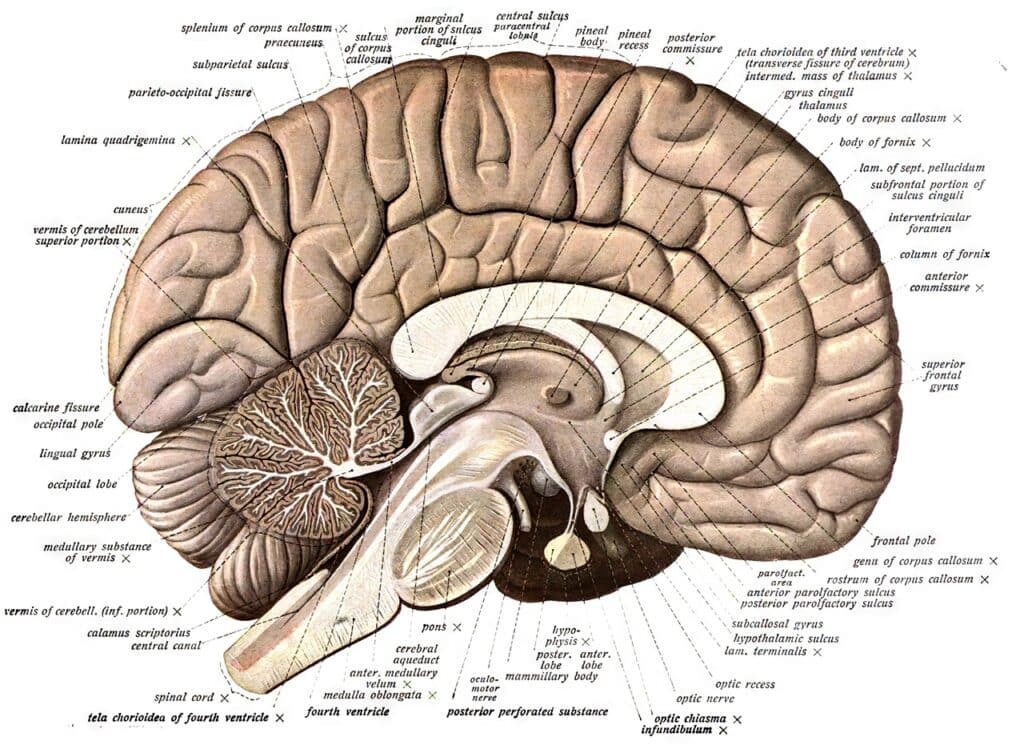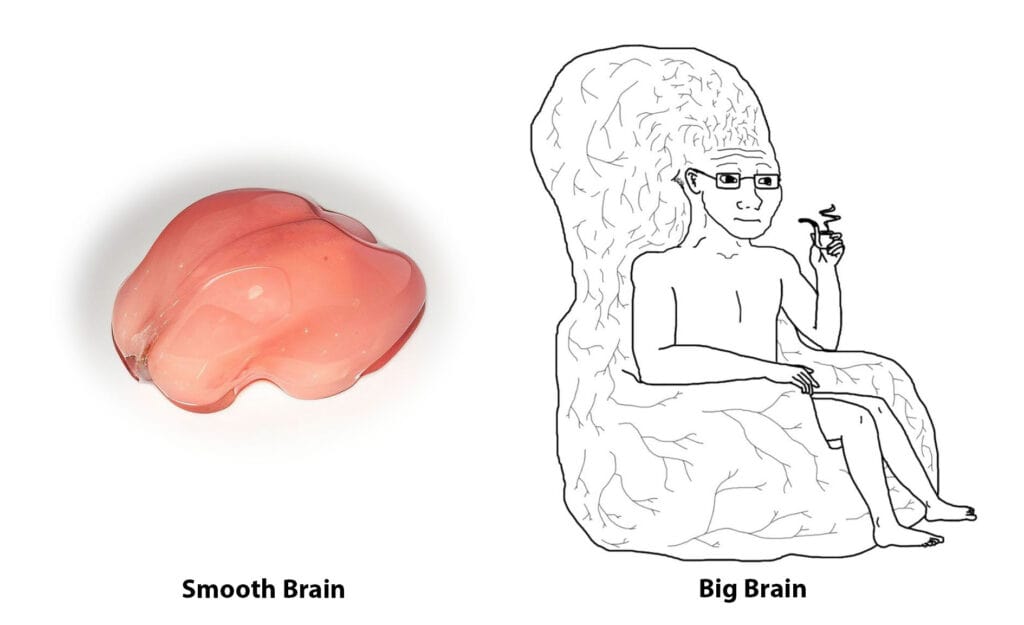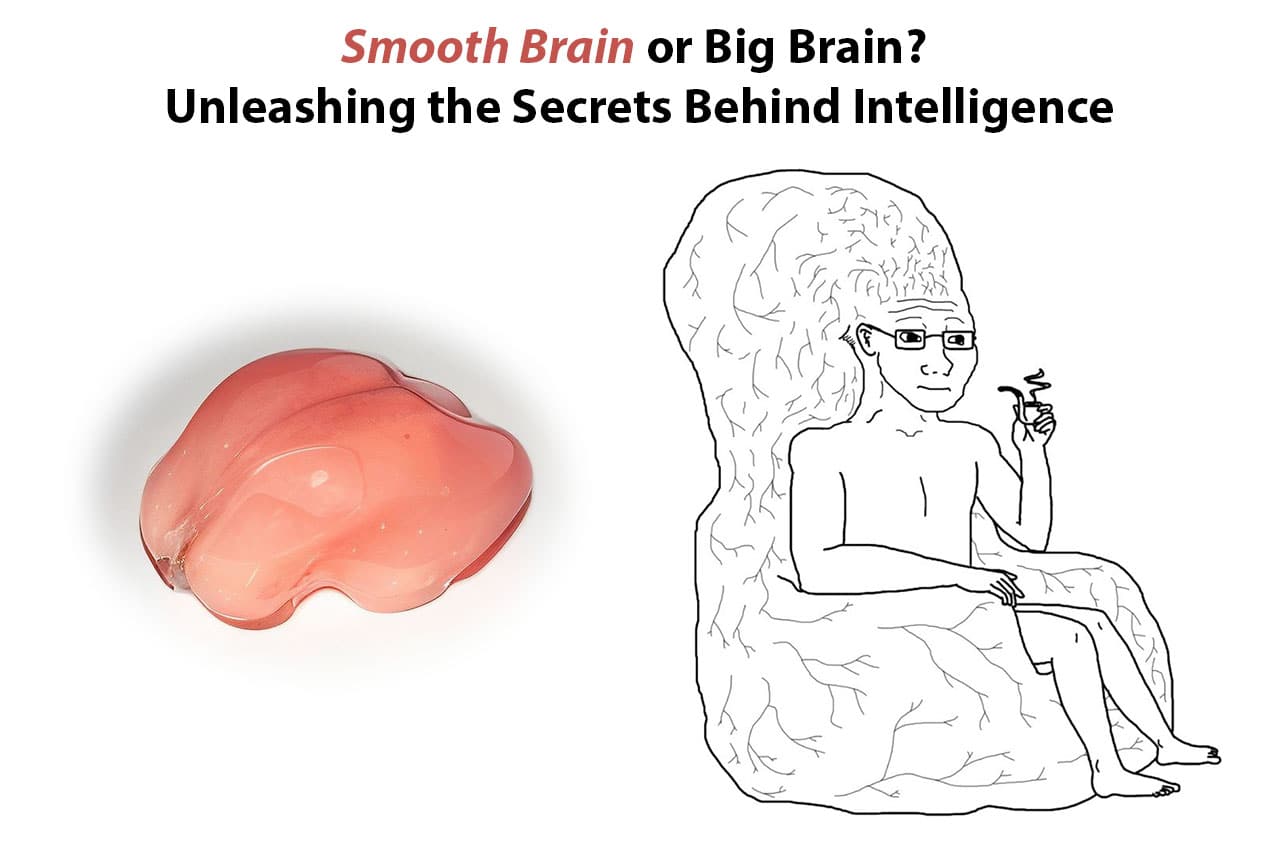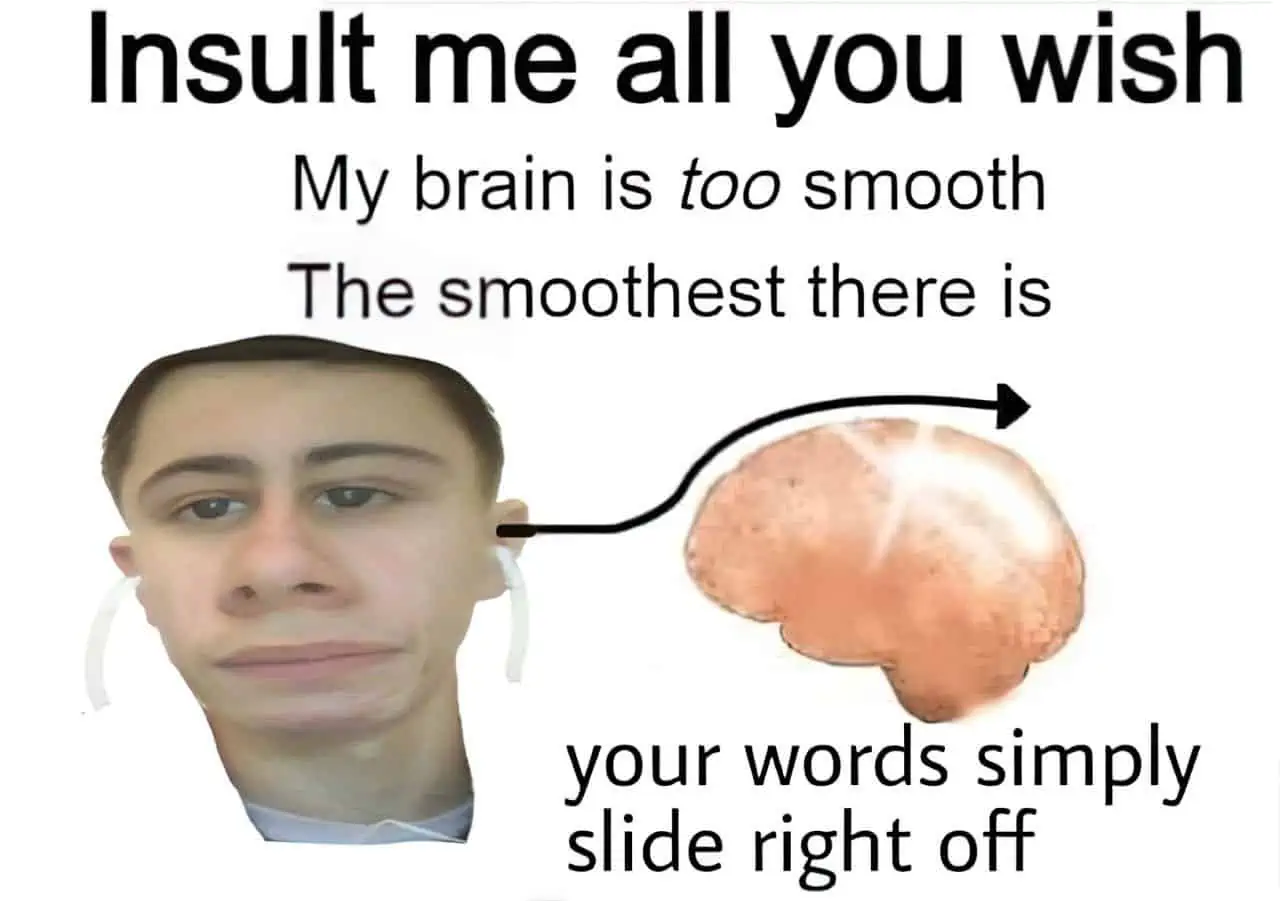Ever wondered why some folks seem smarter than others? I did, too, particularly after learning that the human brain is the most complex object known to us, with 86 billion neurons intricately connected.
This article unravels these mysteries, diving deep into the world of neuroscience to understand the essential differences between a “smooth” brain and a “big” brain. Keep reading – it’s time to stretch your understanding of intelligence!
Key Takeaways
Smooth brains, also known as lissencephaly, lack the typical folds and wrinkles of a healthy brain. This condition can lead to cognitive impairments and developmental delays.
Big brains have a larger size and more complex folding patterns, which allow for increased surface area and connectivity within the brain. This can enhance cognitive abilities such as problem-solving and memory.
Brain size alone does not determine intelligence; other factors like brain structure, efficiency, genetics, environment, upbringing, and education play significant roles.
Abnormal brain folding patterns can contribute to neurological conditions such as lissencephaly or polymicrogyria, affecting behavior, personality traits, and mental health. Understanding these complexities is crucial for diagnosis and treatment purposes.
Table of Contents
Understanding the Brain: An Overview

The brain is a highly complex organ consisting of 86 billion neurons and intricate networks of axon fibers.
The Role of Folds and Wrinkles
As an expert in the field, it’s clear to me how critical a role our brain’s bumps and grooves play. These are not random texture details; they’re a part of brain folding, a vital process for maximizing neuron packing within our skull.
The more folds we generally have, the larger the surface-to-volume ratio there is for housing neurons – which are responsible for processing and transmitting information through electrical signals.
This greater capacity allows us to perform complex cognitive tasks with ease and efficiency. That said, brain folding isn’t all about quantity over quality. Several factors, like initial outer layer thickness and layer stiffness, impact this procedure too.
It’s also crucial to note that abnormal folds can be indicators of neurological conditions like schizophrenia or epilepsy – revealing just how deeply the story of these folds becomes interwoven into our health narrative.
What is a Smooth Brain?
A smooth brain, also known as lissencephaly, is a condition where the brain lacks the usual folds and wrinkles. This affects cognitive functions and can lead to developmental delays.
Want to know more about how a smooth brain differs from a big brain? Keep reading!
Understanding Lissencephaly
“Lissencephaly, a developmental brain disorder that results in a ‘smooth brain’ appearance, is a fascinating yet challenging aspect of neuroscience. The term literally means ‘smooth brain.’
In this condition, the usual bumps and grooves we recognize on a healthy brain are missing. This absence dramatically impacts cognitive functions and can lead to severe neurological problems along with developmental delays.
Its understanding has significantly been aided by advancements in neuroimaging. We’ve discovered that abnormality in axon density contributes to lissencephaly‘s characteristic smoothness – low axon density areas forming valleys while high-density regions form ridges that become muted or disappear altogether.
The mechanics of this rare phenomenon provide us new insights into complex human brain connectivity as well as potential diagnostic tools for early detection of other related disorders.”
Impact on Cognitive Functions
Let’s dive deep into how a smooth brain impacts cognitive functions. A critical point to understand is that in the case of lissencephaly, where the brain lacks the typical folds and wrinkles, it directly influences intelligence and everyday skills.
The brain’s folding process maximizes its surface-to-volume ratio, allowing more neurons to pack within the same space. These neurons are essential for transmitting electrical signals, which aid in learning and responding to environmental stimuli.
Abnormal brain folding that results in conditions like lissencephaly can cause significant neurological issues and delays. When the number of these information-transmitting axons takes a dip, you may start noticing effects on memory processing, problem-solving ability, and other mental feats we often take for granted.
The mechanics of this neural network – its formation and maintenance; all tweak our intellect level with an invisible hand guiding our mental prowess or decline behind the scenes due to irregularities like having a smooth-brain structure.
What is a Big Brain?
A big brain refers to a larger-than-average brain size, which has been correlated with higher intelligence and cognitive abilities. Read on to learn more about the significance of brain size in understanding intelligence and how it relates to overall brain function.
The Significance of Brain Size
As men, we often hear the phrase “big brain” thrown around when it comes to intelligence. But what is the significance of brain size? Well, let me break it down for you in simple terms.
The human brain is a remarkable organ, with around 86 billion neurons and incredibly complex connections between them. While brain size alone does not determine intelligence, research has shown that there is indeed a correlation between larger brains and higher cognitive abilities.
You see, a larger brain provides more room for these billions of neurons to form intricate networks and process information. It allows for increased connectivity and communication within the brain, which can enhance various cognitive functions like memory, problem-solving, and creativity.
However, it’s important to note that bigger doesn’t always mean better when it comes to intelligence, just as muscle mass doesn’t solely dictate strength or fitness level.
In fact, studies have also found that other factors, such as brain structure and efficiency, play significant roles in determining intelligence levels. So while a big brain may provide some advantages in certain areas of cognition, it’s not the sole determining factor of intelligence.
Intelligence is a multi-faceted concept influenced by genetics, environment, upbringing, and education – all working together like puzzle pieces fitting into place.
Relation to Intelligence and Cognitive Abilities
As men, we often wonder about the connection between brain size and intelligence. While it’s tempting to believe that a bigger brain automatically means greater cognitive abilities, the reality is more complex.
It turns out that brain folds and wrinkles play a significant role in determining intelligence.
The folds and wrinkles of our brains, known as gyri and sulci, are responsible for increasing the surface area of our cerebral cortex—the outer layer responsible for higher-order thinking.
This increased surface area allows for more neurons and connections within the brain, ultimately enhancing our cognitive capabilities.
Furthermore, neuroimaging studies have shown that individuals with more pronounced folding patterns tend to exhibit better problem-solving skills and memory capacity. On the other hand, conditions like lissencephaly, where the brain lacks these intricate folds, often result in severe developmental delays and intellectual disabilities.
Comparing Smooth Brain and Big Brain

Smooth brains and big brains are two distinct types of brain structures that have significant differences in terms of their form and function. Understanding these differences can provide valuable insights into intelligence and cognitive abilities.
To delve deeper into the fascinating world of brain mechanics, continue reading this informative blog post.
Differences in Structure and Function
As I dive deeper into the differences between smooth brains and big brains, it becomes clear that their contrasting structures significantly impact their functions. Smooth brains, specifically those with lissencephaly, have a simplified surface with far fewer folds and wrinkles compared to typical brains.
This lack of complexity affects cognitive functions such as language development, motor skills, and overall intelligence. On the other hand, big brains with well-developed folding patterns have a greater surface area for neurons to interact and process information efficiently.
The intricate folding allows for increased connectivity within the brain, resulting in enhanced cognitive abilities and higher levels of intelligence overall. So while size may not be everything when it comes to brain power, the unique structure of big brains definitely plays a crucial role in driving intellectual capabilities.
Potential Impact on Behavior and Personality
Understanding the potential impact on behavior and personality between a smooth brain and a big brain is crucial in comprehending the differences in intelligence. Brain folding, which differs between these two types of brains, may contribute to variations in behavior and personality traits.
Abnormal brain folding patterns can lead to developmental disorders and neurological problems, potentially influencing behavior and personality. Conditions like lissencephaly and polymicrogyria, resulting from abnormal brain folding, can cause severe neurological problems and developmental delays, highlighting their potential impact on behavior and personality.
Additionally, conditions such as epilepsy and schizophrenia have been associated with abnormal brain folding patterns, further emphasizing the influence on behavior and personality traits.
The thickness and stiffness of the brain’s layers also play a role in the folding process, potentially affecting behavior and personality. Axon density contributes to different brain structures’ formation and connectivity levels; therefore, it may influence how individuals behave or perceive things differently due to their unique brain structure.
Overall, research efforts are being made by initiatives like the US BRAIN Initiative to unravel complexities related to brain folding patterns that could provide valuable insights into understanding behavioral tendencies as well as personalities.
The Role of Brain Mechanics in Brain Disorders
Brain mechanics play a crucial role in the development of brain disorders such as lissencephaly and polymicrogyria, causing neurological problems and developmental delays. Want to understand how? Read on!
The Effect of Brain Folding on Mental Health
Abnormal brain folding can have a significant impact on mental health. When the brain does not develop its characteristic folds and creases properly, it can lead to conditions such as lissencephaly and polymicrogyria, which are associated with neurological problems and developmental delays.
These conditions can affect cognitive functions, including memory, attention, and problem-solving abilities. Additionally, abnormal brain folding patterns have been linked to disorders like schizophrenia and epilepsy.
Understanding the mechanics of brain folding and its relationship to mental health is crucial for early diagnosis and effective treatment of these conditions. Ongoing research efforts continue to explore the intricate connections between brain structure, development, and mental well-being.
The Brain and Popular Culture
Popular culture has embraced the concept of brain differences, with the “smooth brain” meme and “big brain” Twitch emotes becoming internet sensations.
The Smooth Brain Meme
Have you ever come across the hilarious “Smooth Brain” meme online and wondered what it’s all about? Well, let me break it down for you. The Smooth Brain meme and jokes have become a popular way to highlight the differences in intelligence between individuals.
It typically involves comparing someone with a “smooth brain” to someone with a “big brain.” While this might sound like just another silly internet trend, there is actually some interesting science behind it.
You see, our brains have folds and wrinkles for a reason. These folds, known as gyri, and grooves called sulci, play an important role in increasing the surface area of our brains.
This increased surface area allows for more connections between neurons and ultimately enhances cognitive abilities. So when we refer to someone as having a smooth brain, we’re jokingly implying that they may lack these critical folds and therefore have limited intellectual capacity.
Of course, it’s essential to remember that the Smooth Brain meme is meant purely for fun and should not be taken too seriously. Intelligence is much more complex than just the number or depth of brain folds.
The Big Brain Twitch Emotes

As guys, we can’t help but be fascinated by the clever and humorous world of Twitch emotes. One popular emote that’s been making waves is the “Big Brain” symbol. You’ve probably seen it being used to show off someone’s intelligence or cleverness in a playful way.
It’s become a fun shorthand for highlighting brainpower in online culture. On the flip side, there’s also the hilarious “Smooth Brain” emote, which playfully teases individuals for their perceived lack of smarts or poor decision-making skills.
These emotes have tapped into our collective curiosity about intelligence and brain functionality, showing just how interested we are as a society in exploring these concepts. They’ve become a lighthearted way for us to engage in discussions around brainpower while having some laughs along the way.
Frequently Asked Questions About Smooth Brain vs Big Brain
What is the difference between a smooth brain and a big brain in terms of intelligence?
In terms of intelligence, the term “smooth brain” is used colloquially to describe someone or something that lacks intellectual capacity or critical thinking skills. On the other hand, a “big brain” refers to someone who possesses advanced cognitive abilities and demonstrates higher levels of intelligence.
Are there any medical conditions associated with having a smooth brain?
Yes, there are certain medical conditions that can result in individuals having a smooth brain structure or reduced cerebral convolutions. These conditions include lissencephaly (a developmental disorder), polymicrogyria (excessive small folds on the brain surface), and agenesis of the corpus callosum (absence or underdevelopment of the bundle of nerves connecting both hemispheres).
Can intelligence be solely determined by brain size?
No, intelligence cannot be solely determined by brain size alone. While larger brains may indicate a potential for higher cognitive abilities, factors such as neural connections, synaptic density, neurotransmitter function, and environmental influences also play significant roles in determining an individual’s level of intelligence.
Is it possible to enhance one’s intelligence regardless of their initial brain structure?
Yes, it is possible for individuals to enhance their intelligence regardless of their initial brain structure through various means such as continuous learning, mental stimulation exercises like puzzles or reading challenging material, engaging in critical thinking activities, maintaining healthy lifestyle habits including proper nutrition and regular exercise which promote optimal neuronal function among others.
Conclusion
In conclusion, understanding the differences between smooth brains and big brains is crucial in unraveling the complexities of intelligence. While brain size and folds do play a role, it’s important to remember that intelligence is much more nuanced than these factors alone.
By delving deeper into brain mechanics, disorders, and cultural references, we can gain a better appreciation for the intricacies of our remarkable minds.



